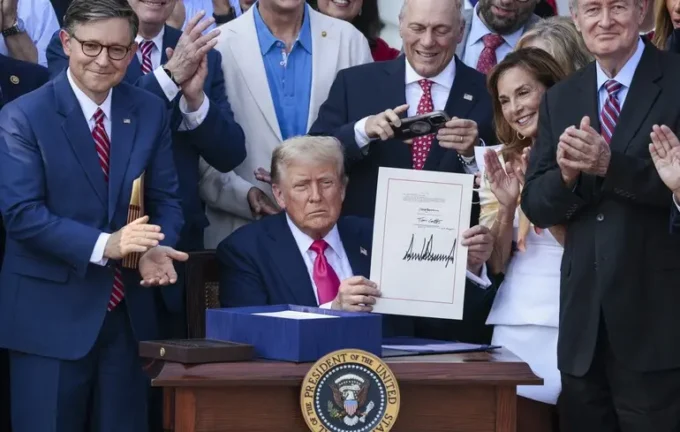Donald Trump Markedly Signs His ‘Great, Beautiful Law’: A Political Victory Amid Controversy

In a historic moment for U.S. politics, President Donald Trump officially signed one of the most significant pieces of legislation of his administration, a result of prolonged and intense negotiations with the Republican Congress. This comprehensive budget bill, often referred to as the 'Great, Beautiful Law,' extends key tax benefits and gradually reduces funding for the Medicaid program. The signing ceremony took place during the Fourth of July Independence Day celebration on the White House lawn, highlighting the event's symbolic importance. The celebrations included notable elements such as the flyover of two B-2 stealth bombers, which recently conducted strikes on Iranian nuclear facilities, adding a military spectacle to the festivities. This legislation represents a major legislative achievement, coming after a closely divided Senate vote—50 to 50, with Vice President Mike Pence casting the decisive tie-breaking vote. The House of Representatives followed suit the next day, approving the bill with 218 votes in favor and 214 against, despite opposition from some Republican members. This legislative success coincides with a period of external victories for the Trump administration—rising employment figures, decreasing migrant apprehensions at the southern border, and other signs of internal stabilization. Trump emphasized that these past six months have been among the most successful in his presidency, citing record achievements in various spheres. The law incorporates many promises from Trump's 2024 presidential campaign, such as extending the tax cuts introduced in 2017, which otherwise would have expired this year, and eliminating some taxes on tips. It also allocates a significant increase—$150 billion—for border wall construction, immigration enforcement, and deportation efforts. An additional $150 billion is designated for defense projects such as shipbuilding and the 'Golden Dome' missile defense system. Furthermore, the legislation promotes expanded domestic fossil fuel extraction—oil, coal, and natural gas—and proposes raising the debt limit by an additional $5 trillion, ensuring the country’s financial stability and avoiding default risks. However, critics argue the law undermines social programs, reducing healthcare and nutrition assistance to vulnerable populations. These cuts aim to offset the revenue loss from tax benefits but threaten to leave millions without proper medical insurance. Democratic Leader Hakeem Jeffries in the House delivered one of the longest speeches in history, condemning the bill for hurting working families. Trump responded by mocking Jeffries and dismissing the criticism as 'political trickery.' Public opinion remains divided; some polls indicate that most Americans are either indifferent or skeptical about the new law. Meanwhile, the White House and Republican officials hope that clarification efforts will eventually improve public support. Political strategists warn that Trump’s approach stirs societal tension, fostering silence and apathy. Despite ongoing political chaos, widespread protests have yet to materialize, raising concerns among analysts about the underlying social unrest.

